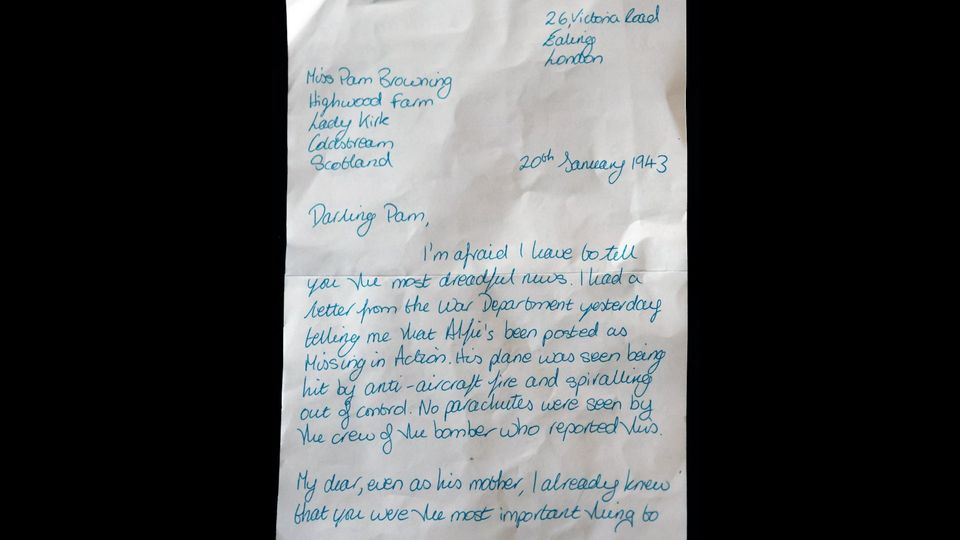A Co Antrim man who collects military memorabilia is seeking to solve the mystery behind two wartime letters found at the bottom of a box of toys his son bought online.
Eddie Graham wants to trace the relatives of the young soldier referred to in the correspondence.
He explained how the two letters, from 1940 and 1943 and still in pristine condition, concern a young man called Alfie Hesketh, his mother Margaret and his fiancée Pam.
“I’ve always had an interest in collecting anything to do with the Army and the war,” said Eddie, who lives in Killead, near Aldergrove.
“My son Stuart spotted a collection of vintage toy Army trucks and vehicles for sale on an online site and thought it might be something I’d like to add to my collection, so he bought it for me.
“But when I opened the box when it arrived, these two letters, still in their envelopes, were sitting there in the bottom.
”My grandfather Bill Johnston was at the Somme and my father John Graham was involved in the Second World War so I’ve always had an interest in military history.
“It was amazing to read the letters and it looks like they’ve hardly been touched in more than 80 years. I’d love to return them to a family member if that was possible.” One of the letters appears to have been passed around since it was written — a previous appeal was made in England to find the soldier and his family.
Now the letter, and a second piece of correspondence, has ended up in Northern Ireland.
Eddie said that while he has reached out to an address on one of the letters, his search has so far drawn a blank.
“I just think these might mean something to a family out there who might like to have them back,” he said.
“I did manage to get in touch with one of the addresses on the letters, but they said they don’t know anyone mentioned in the letters.
“I’ll keep them safe for now in case I can track down any family members who might like to see them.”
The first letter, dated October 1940, was written by a girl called Pam, in Clerkenwell, London. The letter was addressed to Alfie Hesketh and details how “we spent all night down in the shelter” after the worst day of air raids yet.
“Twice the whole shelter shook as though the whole thing was going to collapse and the noise was terrific,” Pam wrote.
WW2 letter found by Eddie Graham which he found at bottom of an auction lot. Picture by Peter Morrison
It refers to damage to airfields in Kent, where Alfie appears to be stationed, and adds: “Please, please write and tell me you’re alright.”
The letter also mentions Alfie’s sister Alice, “with her long scarlet nails” who has just joined the Women’s Land Army, like many young women did in the countryside during wartime.
While that letter shines some light on what young people were going through in wartime Britain, the second letter, written three years later, shows the sacrifices made.
It is dated January 1943, and this time it was written by Alfie’s mother, Margaret Hesketh, and is addressed to Pam Browning, now on a farm in Coldstream, Scotland, who it turns out was to be married to Alfie.
“I’m afraid I have to tell you the most dreadful news,” writes Margaret.
“I had a letter from the War Department yesterday telling me that Alfie’s been posted as missing in action. His plane was seen being hit by anti-aircraft fire and spiralling out of control. No parachutes were seen by the crew of the bomber who reported this.
“My dear, even as his mother I already knew that you were the most important thing to have happened to him in his life and how much he was looking forward to marrying you.
“I know we can still hope, but the gentleman who wrote to me from the Ministry seemed to think we shouldn’t be too confident. I always hated this idea of Alfie transferring from ground crew to flying the Lancaster bombers. At least at Biggin Hill I knew where he was. Call me a silly old woman, but as you know he’s my only son and the centre of my life.”
The letter would have been one of hundreds of thousands sent around Britain during the war as mothers received the news they dreaded.
“I just think this might mean a lot to a family out there if we can trace who the people were and find their relatives now,” explained Eddie.
“Failing that, I’ll leave the letters with the British Legion and allow other people to read them and look at them.
“They might make people realise just how tough things were during the Second World War, how many families suffered a similar loss and how many letters had to be written to mothers about their sons, and from mothers to the others who loved them.”
